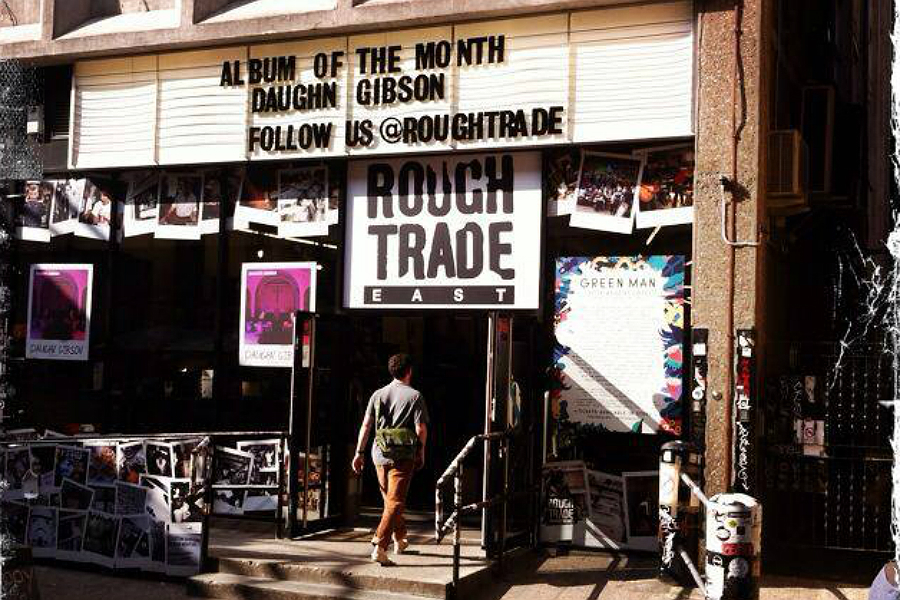Rough Trade Records

A label with more peaks and troughs than its average signing, Rough Trade Records has a colourful history…
When the Strokes’ debut, Is This It, surfaced in 2001, it served a dual purpose. Of course, emerging as they did into parched post-Brit Pop landscape, dominated by the likes of Travis, The Stereophonics and Coldplay (triple shudder), they officially saved rock and roll.
But just as important, at least for us, was the label that put the record out: Rough Trade.
So began an ongoing love affair with a record label worth making a point of looking out for. New releases on the imprint, compilations and their rich back catalogue, suddenly meant our eyes and ears were opened to a wealth of music which had hitherto gone unheard.
Of course, we were well aware of This Charming Man by the Smiths (released in 1984), but we hadn’t previously known – or cared for that matter – who had put it out. Digging deeper, realising the rich vein we’d hit, we came to realise the history of this label was as colourful and as littered with peaks and troughs as any of the bands they represented. Almost.
Beginning life as a record shop in fairly unassuming circumstances in 1976, Rough Trade was established by Geoff Travis, off Ladbroke Grove. Specialising in the embers of punk, reggae, garage rock, fanzines and badges; most interesting about Rough Trade at that point perhaps was its status as a cooperative, run loosely on Marxist ideals – in a very real sense, this was a radical undertaking.
Two years later and the shop had graduated into organising a distribution arm in collaboration with other indie record shops in the UK (dubbed The Cartel), putting out records and selling them in store – the first of which, Paris Maquis, was by French punk band Métal Urbain. This method saw them go on to release the first single by Cabaret Voltaire and the second by Stiff Little Fingers.
Remarkable talent spotting when you think about it, and this fine ear – combined with the infrastructure to reach a national record-buying public hungry for the next thing – saw them become the first indie label in history to put out a record selling more than 100,000 copies, with Stiff Little Fingers’ Inflammable Material charting at number 14.
The ascendency continued into the ‘80s (now regarded as something of a time of milk and honey for the label), with additions including the likes of The Fall, Pere Ubu and Young Marble Giants all bolstering a quickly-growing reputation, but it was the signing of the Smiths – and the nascent Indie Pop scene – a couple of years later that established Rough Trade in the hearts and minds of the UK’s cultural commissars. (Significantly, this period also saw a split between the A&R and distribution divisions, following a decision to allow the shop staff to buy out).
The relationship with Johnny Marr and Morrissey brought with it an astonishing run of 16 chart singles between 1984’s This Charming Man and Last Night I Dreamt That Somebody Loved Me in 1987; in today’s digital download age, it’s almost impossible to imagine this happening again. For anybody, never mind an indie.
Less than a decade later however, Rough Trade was in dire straits, with some catastrophic business decisions cited as the cause; filing for bankruptcy in 1991 the company ended up in receivership, leading to the selling off of assets, including crucially the rights to the name itself. It seemed like the end of the line for an indie institution. Until…
Almost a decade later, Travis and Jeannette Lee (who initially joined the organisation in the late ‘80s), reacquired the naming rights and begin again, this time with the help of Sanctuary Records, and in 2001 the pair marked the label’s 25th anniversary with a DJ set at the V&A. Bathing in the good will, and with a secret weapon up their sleeves, the decision to relaunch would be quickly vindicated.
Is This It was released to much fanfare shortly after; you couldn’t move for The Strokes, the indie clubs and bars were saturated with thrift-store stripy-shirt-clad young men, eyes wild at a record containing an album-worth of singles. The band, and Travis and Lee’s nouse, would lead to Rough Trade’s biggest commercial successes since The Smiths.
The signing of The Strokes was followed by fellow New Yorkers The Moldy Peaches, and later, Jeffrey Lewis, The Libertines and British Sea Power. Rough Trade, regaining its confidence in the process, was now an internationally recognised phenomenon, known for unearthing rough diamonds as well as fully formed hit machines.
With more recent additions to the roster including the likes of Warpaint and Palma Violets, you’d think the future health of indie – whatever form that may come in – is in good hands as long as there is a Rough Trade.





